Jack Berry Hobbs was an English professional cricketer who played for Surrey between 1905 and 1934 and for England between 1908 and 1930. Known as 'The Master', he is widely considered to be one of the greatest batsmen in cricket history. At the time of his era, he was the leading run-scorer and century-maker in first-class cricket. He was a right-handed batsman as well as an occasional right-arm medium-pace bowler. Hobbs also excelled as a fielder, particularly at the cover point position.
As a young boy, he was poor, but he always wanted to play professional cricket. Then in 1901, he was spotted by local teams and joined Surrey with the help of England batsman Tom Hayward. He earned his place at Surrey when he qualified for first-class cricket and scored 88 on his debut and a century in his next game.
| Born: 16 Dec 1882 | Nationality: English |
| Years Active: (1908-1934) | Birth Place: Cambridge, England |
| Death: 21 Dec 1963 | Death Place: Hove, England |
| Role: Batsman | Batting Style: Right-Handed Bat |
| Bowling Style: Right-arm Medium | Nickname: The Master |
He was the eldest son of twelve children born to John Cooper Hobbs (father) and Florence Hobbs (mother). His father was a member of staff at the Cambridge University cricket ground, and also acted as a professional umpire. His mother was a home-maker.
Jack Hobbs married Ada Ellen Gates in 1906. The couple had four children. As a couple, they were very dedicated to each other, and she often accompanied him on cricket tours overseas.
As a child, Hobbs lived in Rivar Place (near York Street), Cambridge, and attended St Matthew's School. He was self-taught and did not receive any coaching. When he was a boy, he used to field at the college nets during school holidays and play a game of cricket with the college servants. He used a tennis ball and cricket stump as a bat. As a result of this primitive practice, he was able to develop his skill. Even though Jack was only 10 years old, he tried to emulate the strokes he'd seen University men playing in college games.
In his 12th year, he joined the church choir team at St. Matthew's and after that, borrowed by Jesus College choir to bat. The Ivy Boys Club was founded by him and they played cricket and football on Parker's Piece.
On 1st January 1908, Hobbs played his first Test match at Melbourne Cricket Ground. Hobbs scored 83 runs in 182 minutes as England opened their batting on the second day. For England to win, they needed 282, and Hobbs scored 28 to win by one wicket. As a result, he retained his place throughout the series. In the fourth match, he scored 57 on a pitch that had been badly affected by rain. Throughout the game, he hit ten fours and thrashed the bowlers.
In the final match, he scored 72 in his final innings, but he could not prevent a third consecutive English defeat-the home team won 4–1. During Test matches, he scored 302 runs at an average of 43.14. He also scored centuries against Tasmania and Victoria, totaling 876 runs at a 41.71 average.
The winter of 1909 was Hobbs's first visit to South Africa. During that time, South Africans were known for their googly bowlers (back of the hand spinners) and matting wickets (canvas mats laid over level ground). As a result of Hobbs' batting and running skills combined with Wilfred Rhodes' batting skills, they managed to outsmart the South Africans. He made 1,124 runs. In recognition of his performance, he was named the World's Leading Batsman.
In 1911-1912, England was playing with Australia. In the first test, Hobbs partnered with Septimus Kanneir. Their contributions led England to victory in the series. Afterwards he became a national hero in England, and everyone respected and loved him for his best performance.
In 1929, Hobbs was stricken with a series of injuries and illnesses, which prevented him from playing cricket. It was his desire to play and give his best for the team, but injuries prevented him from doing so.
He missed the next two Tests after being unfit for the first two against South Africa. This led to speculation that he had retired from Test cricket. These speculations affected him the most.
As a result of illness and injuries, Jack Hobbs decided to retire from the game he loved since his youth. In 1934, he retired from the game. After retirement, he worked as a journalist.
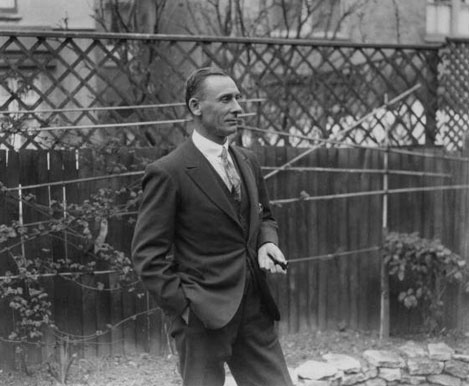
| ODI | |
|---|---|
| Matches: 225 | Runs Scored: 3783 |
| Batting Average:23.79 | Top Score: 175 |
| 200/100/50: 0/1/14 | Wickets: 253 |
| T20 | |
|---|---|
| Matches: 1 | Runs Scored: 1 |
| Batting Average: 10 | Top Score: 10 |
| 100/50: 0/0 | Wickets: 1 |
| Test | |
|---|---|
| Matches: 61 | Runs Scored: 5410 |
| Batting Average: 56.95 | Top Score: 211 |
| 200/100/50:1/15/28 | Wickets: 1 |
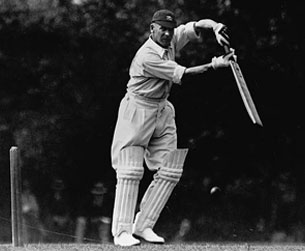
Sachin Tendulkar of India fields during the 2011 ICC Cricket World Cup Group B match between India and the Netherlands at Feroz Shah Kotla stadium on March 9, 2011 in Delhi, India.
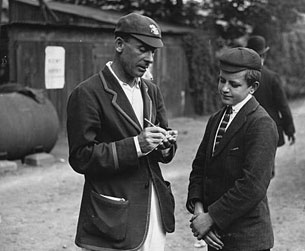
Sachin Tendulkar of India raises his bat on scoring his century during the Group B ICC World Cup Cricket match between India and South Africa at Vidarbha Cricket Association Ground on March 12, 2011 in Nagpur, India.
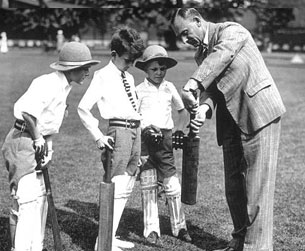
Sachin Tendulkar of India hits out watched by wicketkeeper Matt Prior of England during day five of the 4th npower Test Match between England and India at The Kia Oval on August 22, 2011 in London, England.
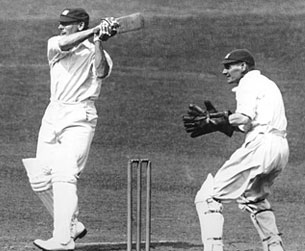
Sachin Tendulkar reach the iconic landmark of 100 international centuries against Bangladesh in the Asia Cup in 2012
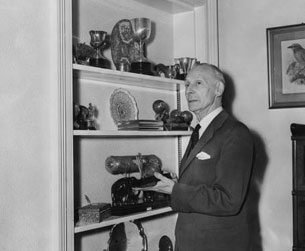
Sachin's first Test century
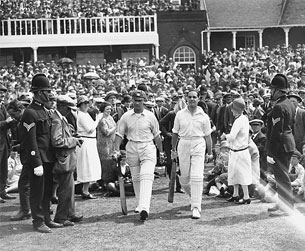
Sachin Tendulkar’s dream to hold the World Cup in his hands and in 2011 it finally happened.